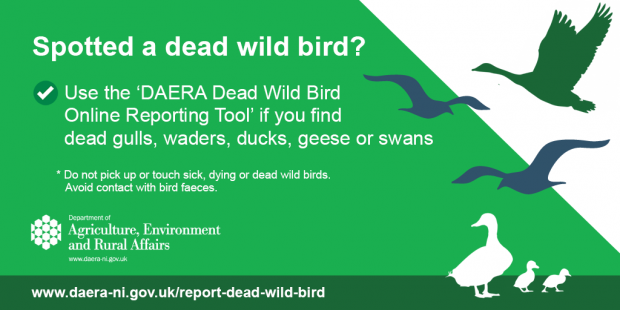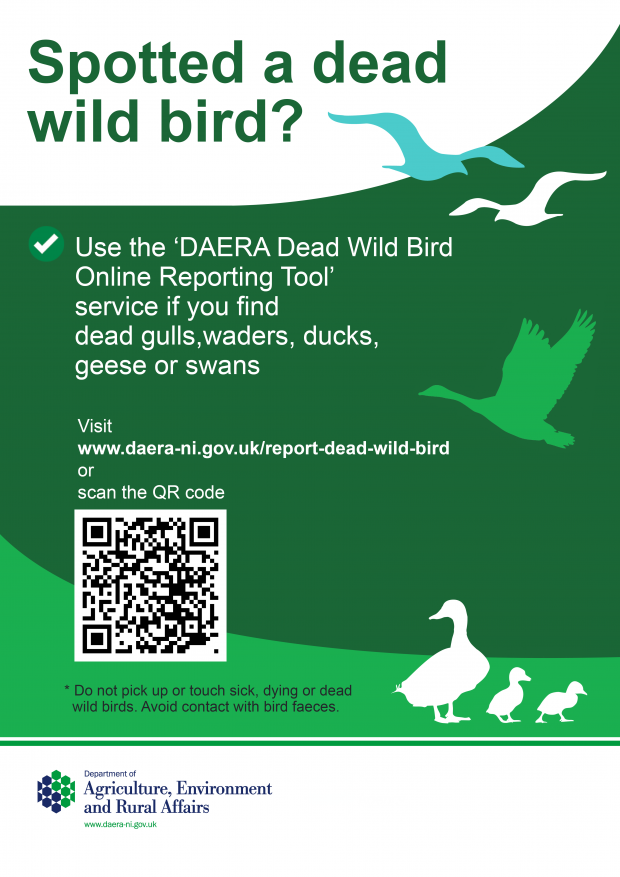
Wild Birds – Surveillance
PLEASE NOTE - Wild bird collections have resumed.
DAERA collects some dead wild birds for Avian Influenza (AI) surveillance purposes to help understand if and when the virus is present in Northern Ireland and how it is distributed geographically. Once HPAI has been detected in a specific area, further testing is not required and therefore, not all birds will be collected.
If you find dead waterfowl (swans, geese or ducks) or other dead wild birds, such as gulls or birds of prey, you can report them using the DAERA Dead Wild Bird Online Reporting Tool.
To report a dead wild bird in mainland UK please use the Report dead wild birds service on GOV.UK.”
Do not pick up or touch any dead or visibly sick birds that you find.
Sick or Dying Wild Birds
Animals that are considered to be wild, that being that they are not under the care or control of any person, are not required under legislation to be provided for in terms of immediate veterinary treatment nor intervention from landowners.
If you find a sick or dying wild bird, these can be reported to the landowner or the USPCA. It is their decision to determine any further course of action.
Please see the below link for information published on the USPCA website
Injured Wildlife | USPCA | Protecting All Animals
For further information see our 'Advice for the Public' section below.
Disposal of dead wild birds on public land
Where dead wild birds are not required for surveillance purposes, the routine collection of dead birds rests with the landowner. Where dead birds are on public land and it is necessary to remove the carcases, it is the responsibility of the landowner to safely dispose of them.
DAERA officials have been working closely with local councils and public sector landowners in relation to their responsibilities as landowners regarding dead wild birds found on their lands. Any decision in that regard is for the council or landowner in conjunction with the Public Health Agency (PHA).
DAERA officials remain available to provide advice as and when required.
Disposal of dead wild birds at domestic premises
If you find any other single dead birds, or dead garden birds, these do not need to be reported to DAERA.
Current advice from the Public Health Agency is not to touch or pick up dead birds. However, if dead birds need to be disposed of:
- if possible, wear disposable protective gloves when picking up and handling dead wild birds (if disposable gloves are not available, a plastic bag can be used as a make-shift glove).
- place the dead wild bird in a suitable plastic bag, preferably leak proof. Care should be taken not to contaminate the outside of the bag
- tie the bag and place it in a second plastic bag
- remove gloves by turning them inside out and then place them in the second plastic bag. Tie the bag and dispose of it in the normal household refuse bin
Make sure to wash your hands thoroughly with soap after coming into contact with any animal and do not touch any sick or dead birds. You should wash hands, nails and forearms thoroughly with soap and water after handling the carcase.
Advice for the Public
The Public Health Agency (PHA) has advised that human infections with AI are rare as it is primarily a disease of birds and the risk to the health of the general public is very low.
The current guidelines from the PHA are as follows:
- do not pick up or touch sick, dying or dead poultry, wild birds or wild animals, and keep pets away from them;
- avoid contact with surfaces contaminated with bird faeces;
- avoid untreated bird feathers (such as those found in the environment) and other bird waste; and,
- maintain good personal hygiene with regular hand washing with soap and use of alcohol-based hand rubs.
For more information, please see the PHA website.
The Food Standards Agency (FSA) has also advised, in avian influenza incursions of this type, that there is a very low risk to public health from the consumption of properly cooked poultry meat or eggs provided appropriate hygiene measures are followed.
Avian influenza is unconnected with coronavirus (Covid-19).
Wild bird cases
Details of the latest avian influenza findings in wild birds in Europe and the UK can be found in the outbreak assessments available at:
https://www.gov.uk/government/publications/avian-influenza-bird-flu-in-europe

Further information is available at www.daera-ni.gov.uk/ai
